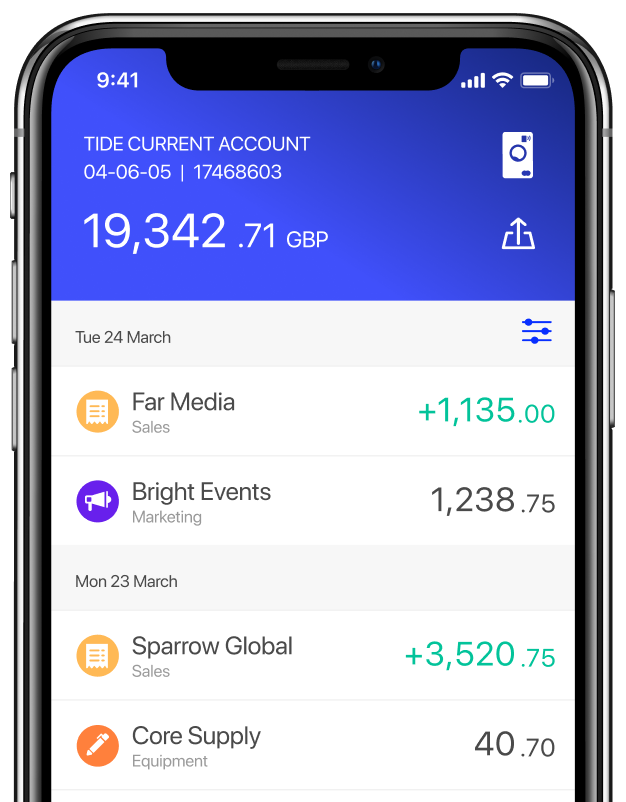
Best European country to start a business? Here’s the data

Ever dreamed of starting a new life in a new land?
The lure of new cultures, new vistas, new cuisines, and new opportunities is undeniable. But if you’ve ever explored the realities of building your business abroad, you will have discovered that the reality is rarely as simple as just moving overseas and setting up shop.
Every country has its own mix of cultural, commercial and legislative rules and values surrounding business. And while it is certainly possible to start a business in most countries (as a foreigner), some countries are more inviting than others.
What does this mean in practice? The commercial hurdles manifest in different ways, including things like high tax rates, expensive startup fees and slow-moving business creation processes.
Other factors to consider, when choosing the dream home for your company, are unemployment rates, the saturation of new businesses, the ease of doing business, and the level of gender pay equality. These are all values that can indicate the health of an economy, the prospects for your company, and the cultural values and norms that you will operate within.
Table of contents
- How did we define the best EU country to start a company?
- Overall index winners
- Winners by category
- Where now?
- Sources
How did we define the best EU country to start a company?
You probably have a few ideas of places where you would love to live and work. But how well does your fantasy stack up to reality? Is your dream destination a nightmare for business? Or is your preferred location doing its best to create a welcoming habitat for entrepreneurs?
To separate hard facts from squishy feelings, we downloaded the World Bank data on a range of national performance indicators for the 27 EU countries plus the UK, including GDP, tax revenue, unemployment rates and the practicalities of starting a company.
We turned these reports into rankings, and then also compiled everything together to assess which countries are most inviting overall. Let’s look at the top performers, and then examine the different criteria individually.
Overall index winners


This is awkward. Turns out the UK is the best place to start your business. So cancel the tickets and unpack your suitcase. No need to emigrate!
Jokes aside, we must stress that our calculations, using the indicators outlined here, do suggest that the UK is a brilliant place to start a business. But our factors tell you nothing about the weather, the cuisine, the people, the culture, the political climate, or any of the other myriad reasons that push people to explore the wider world.
Back to the stats. The truth is that the UK is objectively a good place to do business. It has a large economy, low unemployment, and it’s easy to start and run a business here. The UK topped the cost of starting a business criteria (tied with Slovenia), and also does a good job in a range of categories to earn the top spot.
Ireland is another top contender, pairing its strong economy with reasonable tax rates. Ireland also does well in the rankings for ease of starting and running a business, with a middling performance in the gender pay gap chart.
The Netherlands takes third place, thanks to a combination of its high market capitalisation (the value of the shares issued by Dutch companies), simplicity of starting a company, and very low unemployment rate.
The biggest surprise at the top of our table is Estonia, which landed in fifth place after a strong showing in many different categories, including the ease of doing business in this former Soviet republic. Wikipedia’s description of Estonia supports our conclusion: “Estonia is a developed country with a high-income advanced economy, ranking very high in the Human Development Index”.
Also, Estonia is the first place to offer e-Residency – this means that anyone can base their business and finances in the country – which may have potentially caused an influx of new businesses being created there. Advantages as an e-resident include having full access to Estonia’s advanced digital infrastructure and the same rights in business as Estonian citizens.
Winners by category
When choosing your base, you may be motivated by one or two factors that will have the biggest impact on your operations. So let’s examine the leaders in each category, and also consider the implications of each measure.
Gender pay gap
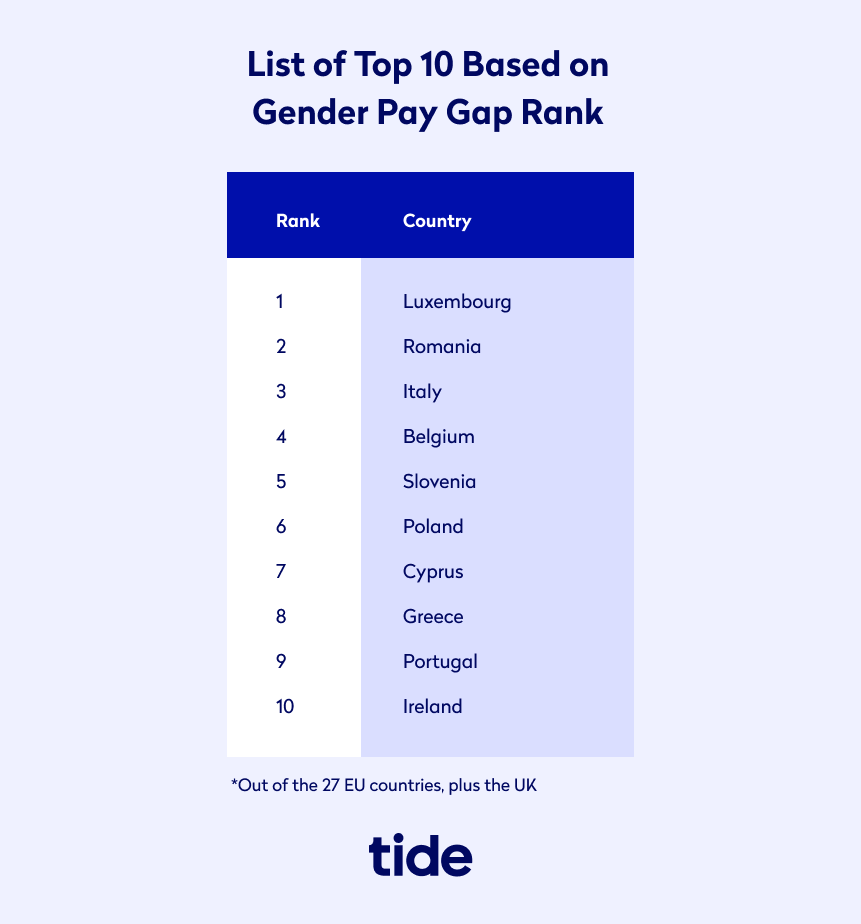

Leader: Luxembourg
Why it might matter: A narrow gender pay gap suggests that a nation has achieved greater gender equality, which might be an indicator of that nation’s values, attitudes, and priorities.
GDP
Leader: Germany
Why it might matter: Gross Domestic Product is the total volume of a nation’s economic output. So Germany produced and sold more stuff in a year than any other European country. This means they have a bigger economy, with more activity, than any other country. This could make it a good place to run your business, as it may provide a larger potential market for your products or services.
Tax revenue rank
Leader: Germany
Why it might matter: The data we used compares a country’s tax income with their GDP, so it shows us how much companies are paying in tax compared to their total income. When compared to other European nations, German businesses pay less tax.
Of course, this is only one measure of taxation, and does not reveal all the costs of doing business in a particular country. Other countries may have higher tax rates, but this may lead to better public services, which might reduce your business expenses.
Unemployment rate
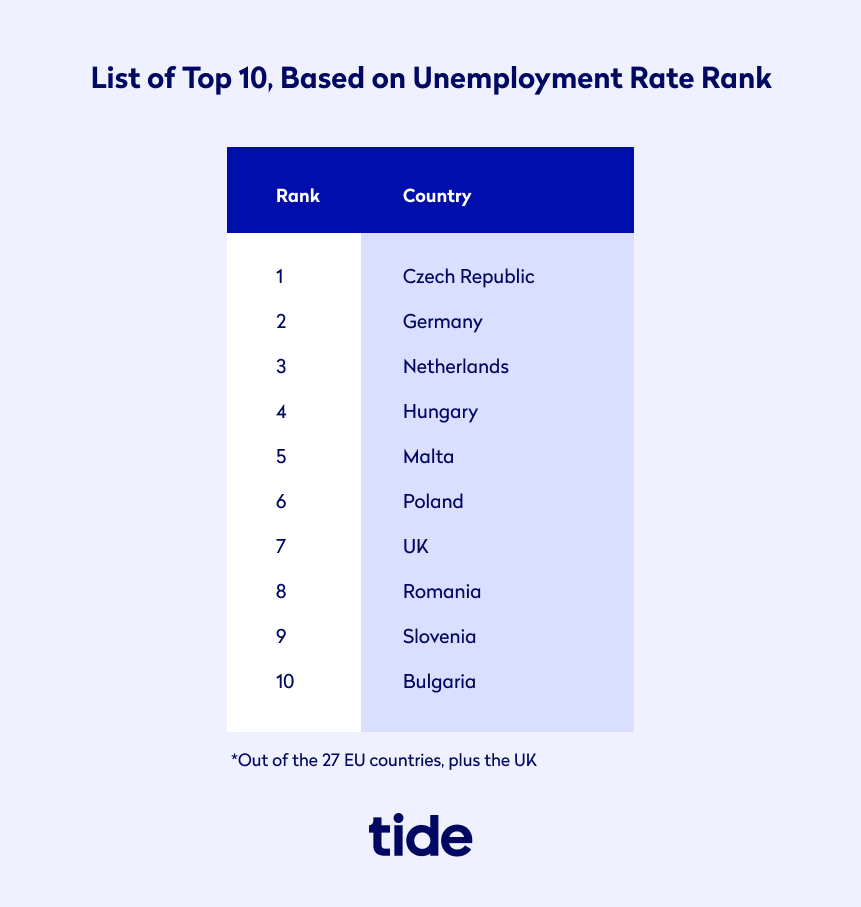
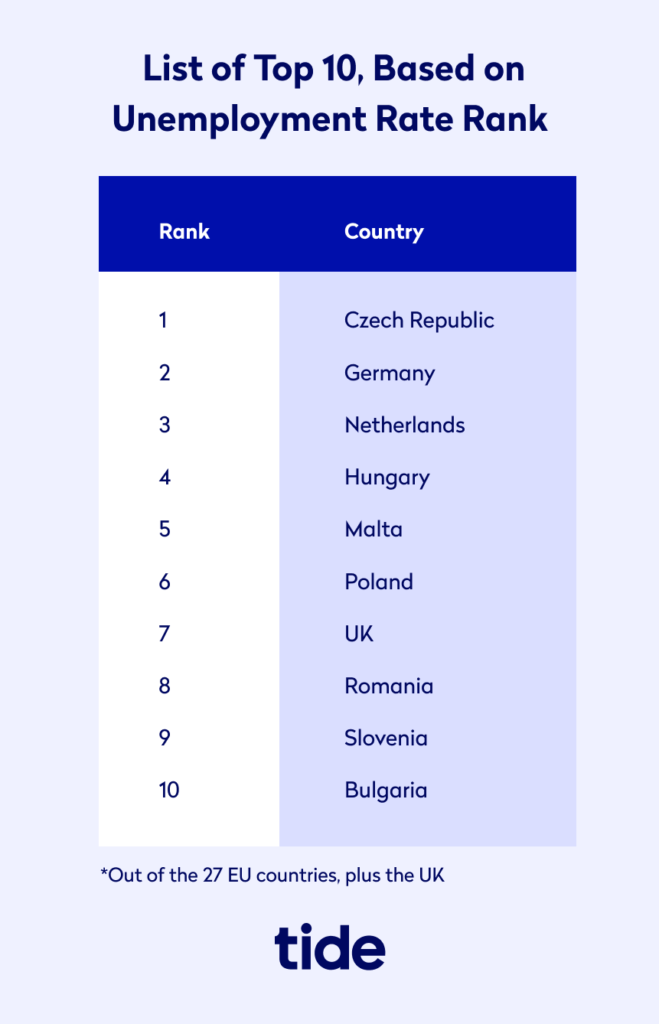
Leader: Czech Republic
Why it might matter: Healthy economies tend to have low unemployment rates. Doing business in a healthy, growing economy might make it easier for you to sell your products and services.
Low unemployment rates could, theoretically, reach a point at which they become a challenge for your business. Recruiting could become difficult – or expensive.
Market capitalisation
Leader: France
Why it might matter: Market capitalisation is another measure of a nation’s economy. It represents the total value of all the shares issued by their companies. France’s place in the table simply means that French companies are worth a lot of money, which may be significant if you are looking for large corporate clients, or are just interested in finding a secure base for your operations.
Number of startup procedures
Leaders: Finland, Ireland, Greece, Slovenia, Estonia
Why it might matter: If a country forces you to follow a 30-step procedure just to start a company, how much time will you spend managing red tape each year? Does their convoluted bureaucracy extend to other areas of their administration?
You may prefer to set up shop in a more business-friendly destination.
Cost of starting a business
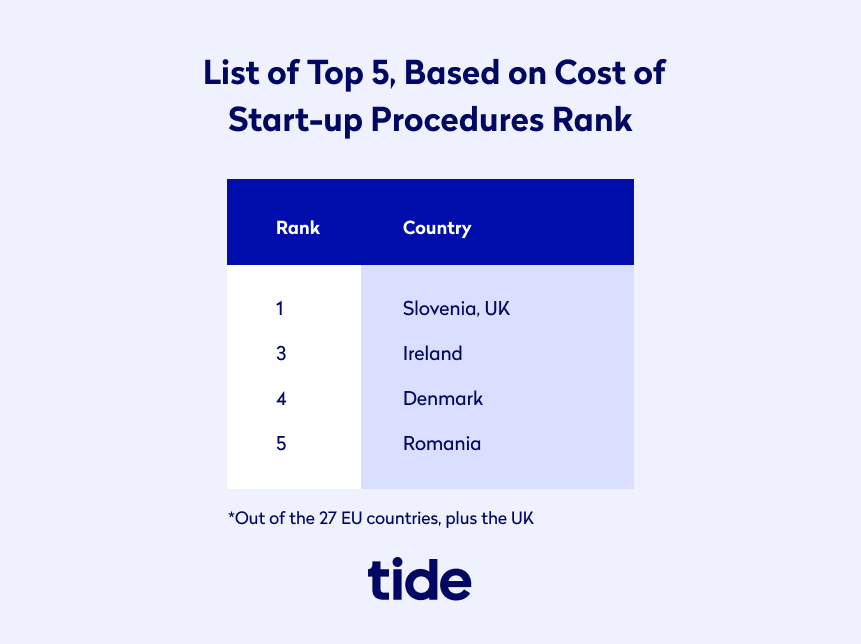
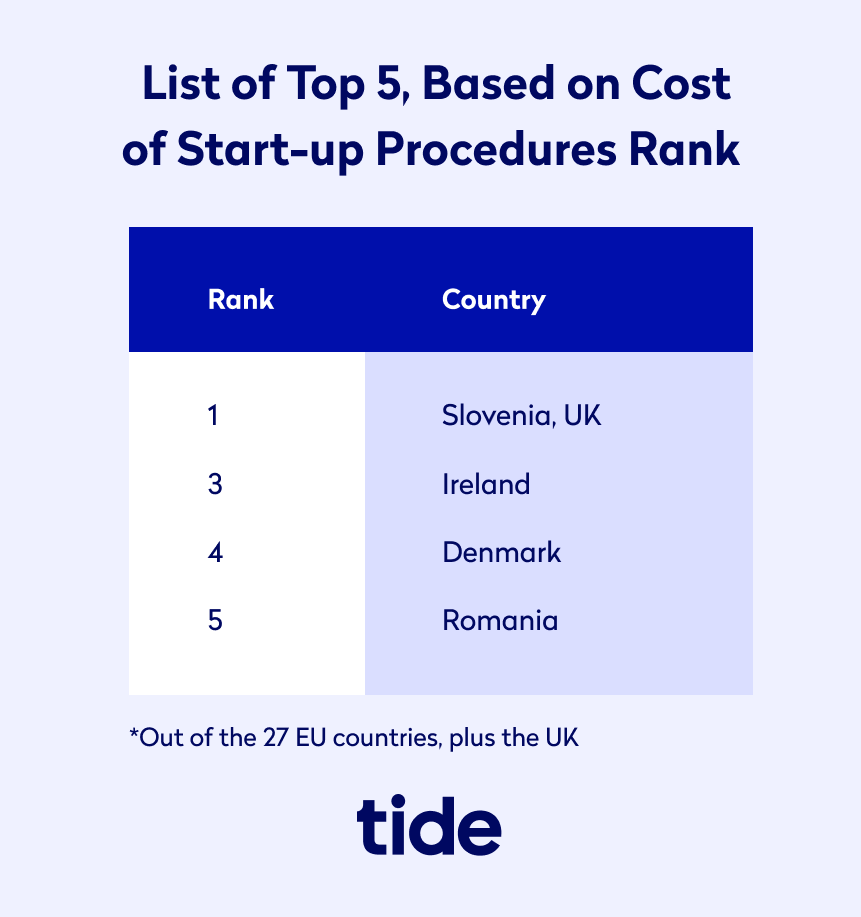
Leaders: Slovenia, UK
Why it might matter: Every penny counts. You’ll want to include the costs of company formation in your business plan, so it’s worth understanding everything that’s involved. In Slovenia, it’s free to start a company.
Time to start a business
Leaders: Denmark, France, Estonia, Greece, Netherlands
Why it might matter: You might be in a hurry to start, or you may just want to plan ahead. Denmark won’t keep you waiting long, but if you like the sound of Poland (at the boot of this table), be prepared to wait 37 days to complete the process (according to World Bank data).
New business density
Leader: Estonia
Why it might matter: This is another indicator of economic activity. It might suggest that a country is growing, or that its economy is particularly attractive or inviting to entrepreneurs.
Ease of doing business

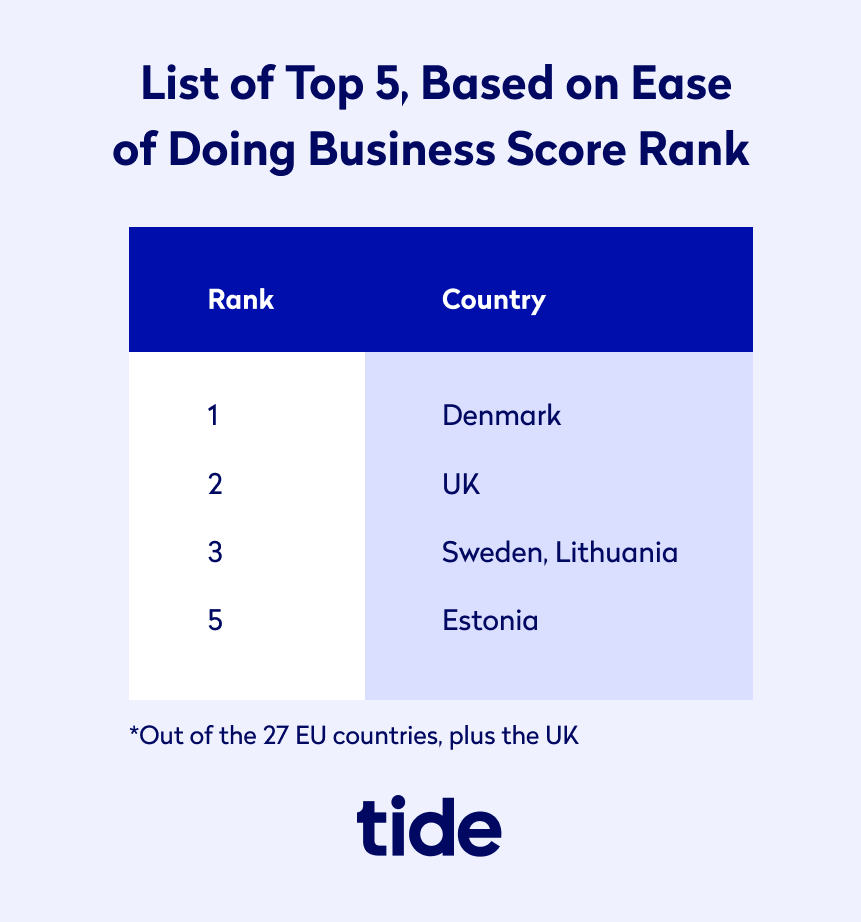
Leader: Denmark
Why it might matter: Governments can make your life easy, or they can make it difficult and stressful. Some countries are notorious for making business confusing and time-consuming, so try to speak to an expat to really understand the realities of doing business abroad.
Where now?
Where will you start your business?
As our summary of the data shows, each country has its own strengths and weaknesses, with very few locations performing well across all criteria.
The key driver is what matters most to you, your colleagues, and your business. Which qualities will make the biggest difference to your future? For example, if you know that your business will need to recruit regularly, you may focus on locations with available talent. Or you may prefer to find a home that offers the lightest tax burden, or the greatest ease of doing business. Alternatively, you may be driven more by human factors rather than commercial considerations, and head for a destination that promises great food, views, and friends.
And the good news is that your current location is usually the best place to start your business. After all, there are no moving costs, you know the market, and you may already have contacts who can help you get started.
Looking to start a business in the UK? Register your company for only £14.99 with Tide
Setting up your business with Tide is incredibly fast, easy and only £14.99. You not only get to officially start your company, but you get a free business bank account at the same time, which is the best way to ensure you’re keeping your finances in order from day one. Be your own boss and register your company with Tide! 🎉
Sources
- GDP (2019 Value (Millions) in US$)
- Tax revenue (% of GDP)
- Unemployment rate (% of total labour force, modelled ILO estimate)
- Market cap of listed companies (current US$)
- Number of start-up procedures (start-up procedures are those required to start a business, including interactions to obtain necessary permits and licenses and to complete all inscriptions, verifications, and notifications to start operations)
- Cost of start-up procedures (Percentage of GNI per capita)
- Time required to start a business (In days)
- New business density (New registrations per 1,000 people ages 15-64, based on latest (2018) figures for each country)
- Ease of doing business score (0 = lowest performance to 100 = best performance)
- Gender pay gap (Unadjusted gender pay gap (as a percentage of male gross earnings) 2019)
Photo by Andrea Piacquadio, published on Pexels




